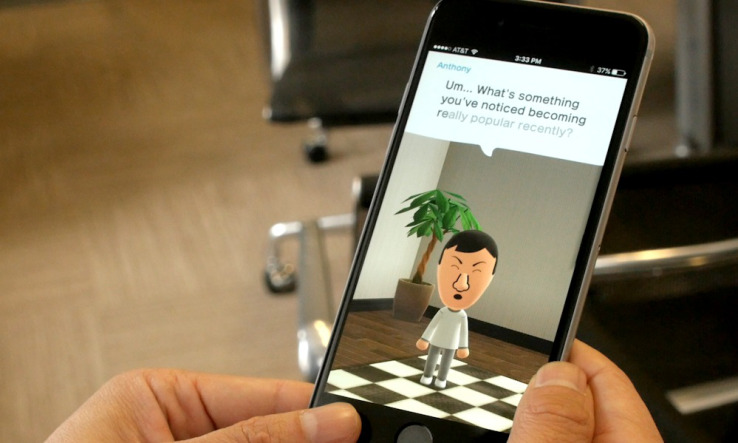

Nintendo’s first smartphone application – the social game called Miitomo, which allows avatars to interact in a virtual world – may already be in decline, according to a new report. Following its launch earlier this year, it seemed that Miitomo found immediate success, shooting to the top of both the iOS and Android app stores. Nintendo also claimed in May that the app was seeing over 10 million unique users worldwide. But more recent findings show that Miitomo is struggling to retain those users, who are now abandoning the app in droves.
It appears that Miitomo’s early success may have been more about the draw of the Nintendo brand, and fans’ curiosity about the company’s first-ever smartphone application, more so than the actual game itself.
In addition, the way the game is structured leads to heavier use during the first few days after download. During that time, users set up and customize their avatar – their “Mii” – by selecting different hairstyles, facial features, outfits, and accessories. They then give the Mii a nickname, choose its personality, and answer getting-to-know you questions that are later shared with other players in the game’s world.
While this part of Miitomo is arguably fun, it’s the later gameplay that’s failing to draw repeat usage.
According to data from a SurveyMonkey Intelligence report, more than half of the users who play Miitomo on a given week don’t come back to play it the next week. This weekly churn of roughly 50 percent indicates that the app could be poised for a quick decline, the report states.

Plus, when comparing Miitomo with more popular titles, Nintendo’s game is played half as often on average in a week as Clash Royale, for example. And Clash Royale’s weekly churn is just 20 percent, compared with Miitomo’s 48 percent. Candy Crush Saga has 23 percent churn, as another point of comparison.
High churn combined with low engagement like this indicates that Miitomo is already seeing a steady decline in active users. As the report says, the problem is not necessarily that it has lower peak weekly active users than other titles, but that Miitomo’s users drop off much more quickly.
Clash Royale’s lowest value is 22 percent from its peak, Candy Crush Jelly’s is 32 percent from its peak, but Miitomo’s weekly active users is 74 percent lower than its peak value – somewhere just above 2.5 million – in a much shorter time span.

For players, both new and old, these numbers mean that the social world of Miitomo will feel more like a ghost town when they arrive. And if there’s no one to interact with, they’ll leave as well. Then the cycle continues.
For Nintendo, Miitomo’s brief boom-then-bust cycle doesn’t necessarily mean the company won’t see success with future app store releases. The company is still new to the world of smartphone gaming, and has already promised a number of promising titles for mobile, including those based on existing franchises like Fire Emblem and Animal Crossing.
And it’s possible that Nintendo never wanted Miitomo to be more than users’ entry point into Nintendo’s universe – not entirely different from the Mii characters players set up on their Wiis years ago. They were fun for a moment, too, but it was Nintendo’s then-fresh take on casual, family friendly gaming that made the Wii a draw.
With Miitomo, Nintendo may have largely wanted to get users to create Nintendo accounts, then willingly share their personal data as part of a larger effort in building up a database of social profiles that will come into play in the future.
Still, the launch of Miitomo as Nintendo’s first title highlights the company’s somewhat unusual strategy when it comes to joining the world of smartphone gaming. Instead of starting off with a sure-fire success, like a mobile Mario title, it’s warming up with other experiments – a social game, a role-playing strategy game, and a community simulation. And if these latter launches also fail to keep users engaged, Nintendo’s brand could lose some of its cachet as it transitions to smartphone gaming.

